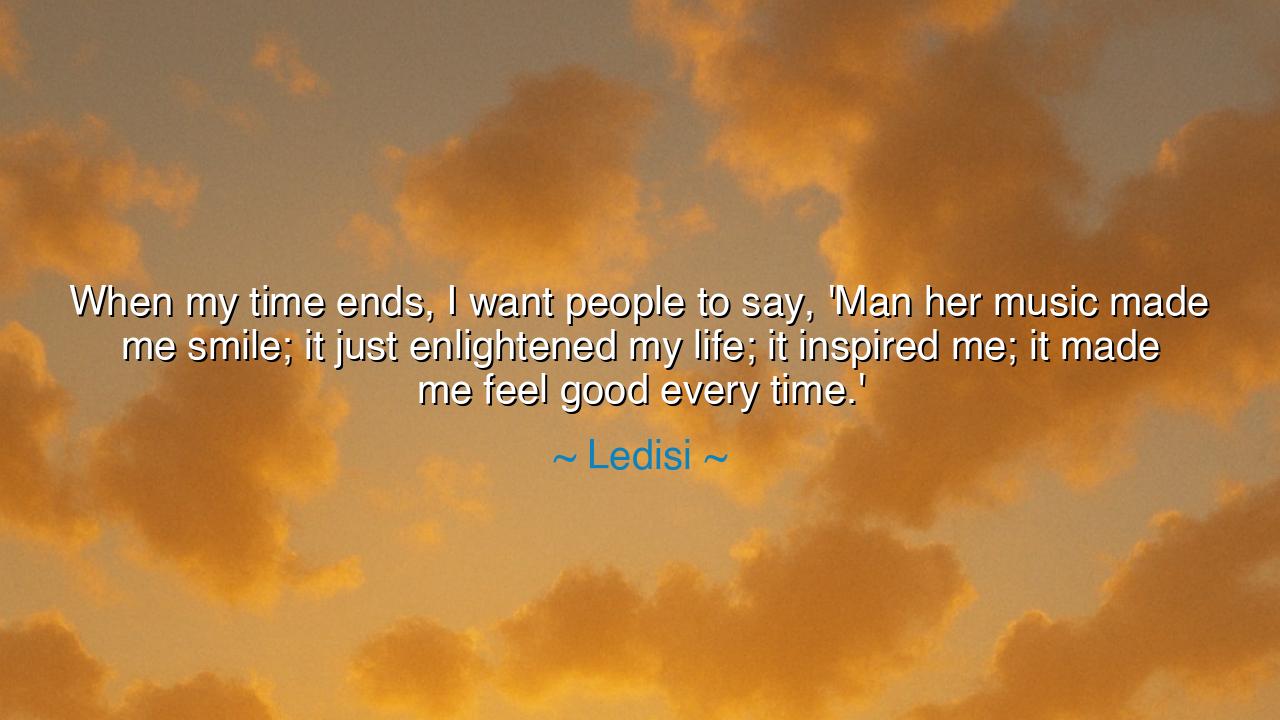
When my time ends, I want people to say, 'Man her music made me
When my time ends, I want people to say, 'Man her music made me smile; it just enlightened my life; it inspired me; it made me feel good every time.'






Hear the words of Ledisi: “When my time ends, I want people to say, ‘Man her music made me smile; it just enlightened my life; it inspired me; it made me feel good every time.’” In this declaration lies the timeless desire of the artist—not to be remembered for wealth or fame, but for the gift they left behind in the hearts of others. The smile, the enlightenment, the inspiration—these are treasures that outlast the body, surviving in the memories of those who were touched by the work. Ledisi speaks not only of music, but of legacy, of what it means to live a life that echoes beyond death.
The ancients knew this truth with clarity. The poet Sappho, whose verses survive only in fragments, did not seek crowns of power but wrote that her words would grant her immortality: “Someone, I tell you, will remember us.” And so it has been. Her poetry, though centuries old, still inspires, still enlightens, still stirs the soul with beauty. Ledisi’s wish belongs to this lineage: to be remembered not as a fleeting figure of an age, but as one whose voice brought joy and strength, whose art carried light across time.
Consider the story of Beethoven. Deaf, ill, and often alone, he poured his soul into his symphonies. In his lifetime, he struggled against despair, yet his music gave the world hope. Even today, when the Ode to Joy resounds, millions smile, uplifted by its triumphant vision of unity. Beethoven’s greatness is not in his suffering, but in the joy he delivered to others through that suffering. In the same way, Ledisi longs not to be defined by her trials, but by the joy she gave through her music.
The smile, as she names it, is not trivial. To bring a smile to another’s face is to lift the burden of sorrow, even if only for a moment. When a listener hears her music and feels good every time, it is proof that art has the power to heal. The ancients honored this gift as sacred: in Greek ritual, music was offered to Apollo, god of light, because sound itself could banish darkness from the soul. To enlighten through song is to take part in this divine tradition—to scatter shadows with the radiance of melody.
There is also humility in Ledisi’s words. She does not ask to be remembered as the greatest or the most celebrated, but as one who made others feel good, who inspired them to live more brightly. In an age where many seek glory for themselves, her wish reflects a higher wisdom: that the measure of a life is not in trophies or monuments, but in the unseen sparks kindled in the hearts of others. For when a song inspires courage, or brings peace, or reminds a weary soul of beauty, it becomes eternal.
The lesson for us is clear: strive to leave behind not only achievements, but joy. Ask yourself, not “What will they say of my power or my possessions?” but “What will they remember of the way I made them feel?” You need not be a singer to live this way. A kind word, a listening ear, a shared laugh—these, too, are like music, capable of leaving behind a legacy of smiles and light.
So let this wisdom endure: when your time ends, let it be said that you brought smiles, that you enlightened lives, that you inspired others to rise and walk more bravely upon their paths. Let your life, like a song, echo beyond your years, bringing comfort and strength to those who remember you. For the greatest immortality is not carved in stone, but in the living hearts of people who say, “They made me smile. They made me feel good every time.”






AAdministratorAdministrator
Welcome, honored guests. Please leave a comment, we will respond soon